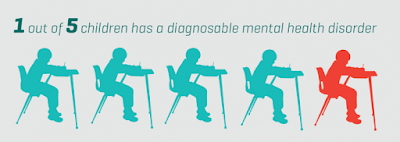Vietnam as a case example of school-based mental health services in low and middle income countries: Efficacy and effects of risk status
The
purposes of this study were to
(a)
assess the efficacy of a universal classroom-based mental health and social
skills program for primary school students in Vietnam, and
(b)
given the universal nature of the intervention, assess outcomes as a function
of risk status (high versus low).
RECAP-VN
is a semi-structured program that provides stu-dents with classroom social
skills training, and teachers with in-classroom consultation on program
implementation and classroom-wide behavior management.
Project
data were collected at three time-points across the academic year from 443
second grade students in regards to their social skills and mental health
functioning, in the Vietnamese cities of Hanoi and Danang.
Mental
health functioning (emotional and behavioral mental health problems) was the
ultimate outcome target (at Time 3), with social skills inter-mediate (at Time
2) outcomes targeted to improve mental health functioning.
Significant
treatment effects were found on both social skills and mental health
functioning.
However,
although program effects on mental health functioning were significant for both
low and high risk status groups, program effects on social skills were only
signifi-cant for low risk status students, suggesting that different mechanisms
may underlie program effects for high and low risk status students.
Overall
the results of this study, one of the first to assess directly the effects of a
school-based program on mental health functioning in a low or middle income
country, provide some support for the value of using school-based programs to
address the substantial child mental health treatment gap found in low- and
middle-income countries.
Title:
| Vietnam as a case example of school-based mental health services in low and middle income countries: Efficacy and effects of risk status | |
| Authors: | Hoang, Minh Dang Weiss, Bahr Cao, Minh Nguyen Tran, Nam |
| Keywords: | child mental health global health LMIC low and middle income countries risk status school-based Vietnam |
| Issue Date: | 2017 |
| Publisher: | SAGE PUBLICATIONS LTD, 1 OLIVERS YARD, 55 CITY ROAD, LONDON EC1Y 1SP, ENGLAND |
| Citation: | ISIKNOWLEDGE |
| Abstract: | The purposes of this study were to (a) assess the efficacy of a universal classroom-based mental health and social skills program for primary school students in Vietnam, and (b) given the universal nature of the intervention, assess outcomes as a function of risk status (high versus low). RECAP-VN is a semi-structured program that provides stu-dents with classroom social skills training, and teachers with in-classroom consultation on program implementation and classroom-wide behavior management. Project data were collected at three time-points across the academic year from 443 second grade students in regards to their social skills and mental health functioning, in the Vietnamese cities of Hanoi and Danang. Mental health functioning (emotional and behavioral mental health problems) was the ultimate outcome target (at Time 3), with social skills inter-mediate (at Time 2) outcomes targeted to improve mental health functioning. Significant treatment effects were found on both social skills and mental health functioning. However, although program effects on mental health functioning were significant for both low and high risk status groups, program effects on social skills were only signifi-cant for low risk status students, suggesting that different mechanisms may underlie program effects for high and low risk status students. Overall the results of this study, one of the first to assess directly the effects of a school-based program on mental health functioning in a low or middle income country, provide some support for the value of using school-based programs to address the substantial child mental health treatment gap found in low- and middle-income countries. |
| Description: | TNS06989 ; SCHOOL PSYCHOLOGY INTERNATIONAL Volume: 38 Issue: 1 Pages: 22-41 Published: FEB 2017 |
| URI: | http://repository.vnu.edu.vn/handle/VNU_123/28564 |
| ISSN: | 0143-0343 1461-7374 |
| Appears in Collections: | Bài báo của ĐHQGHN trong Web of Science |

Nhận xét
Đăng nhận xét